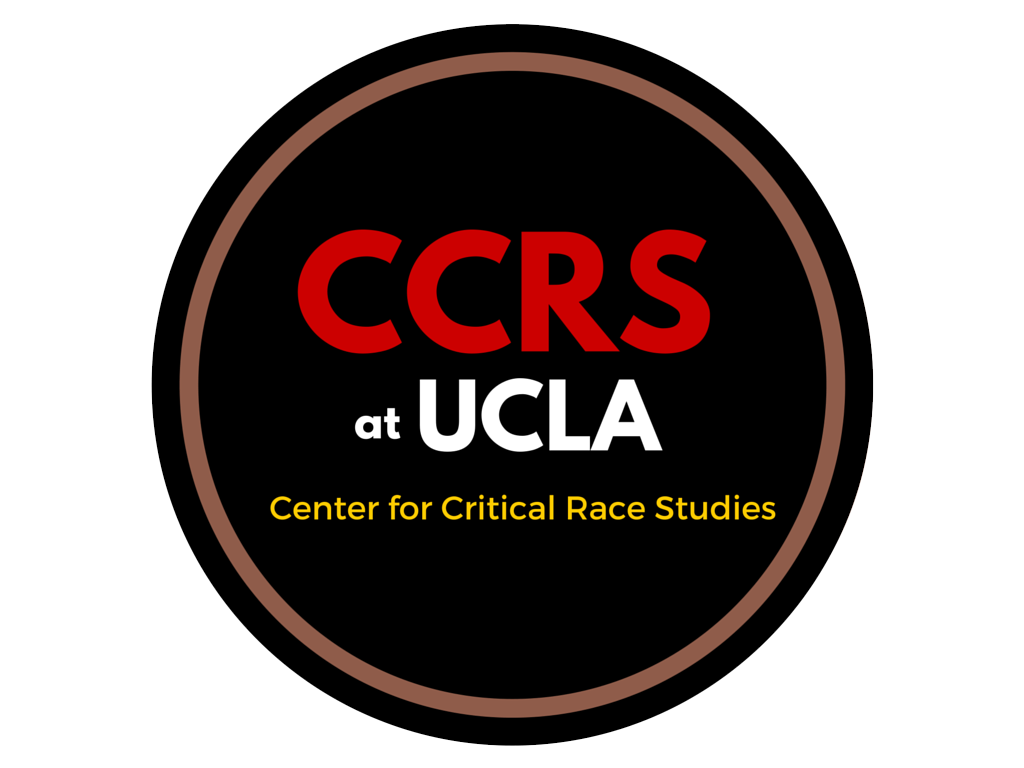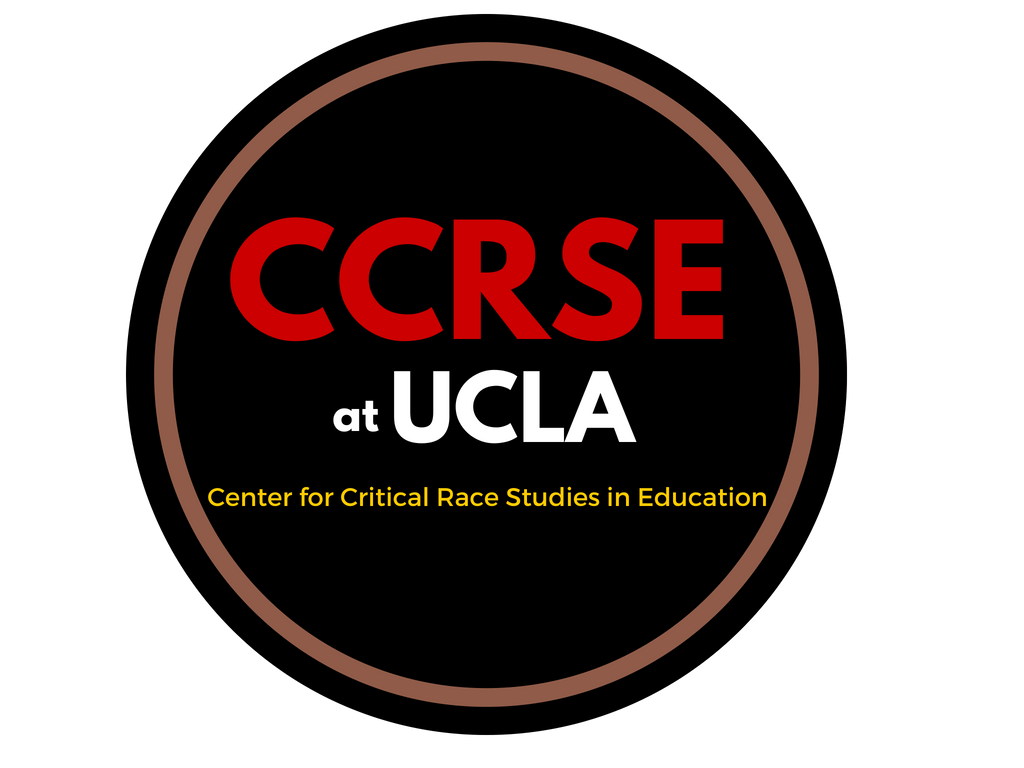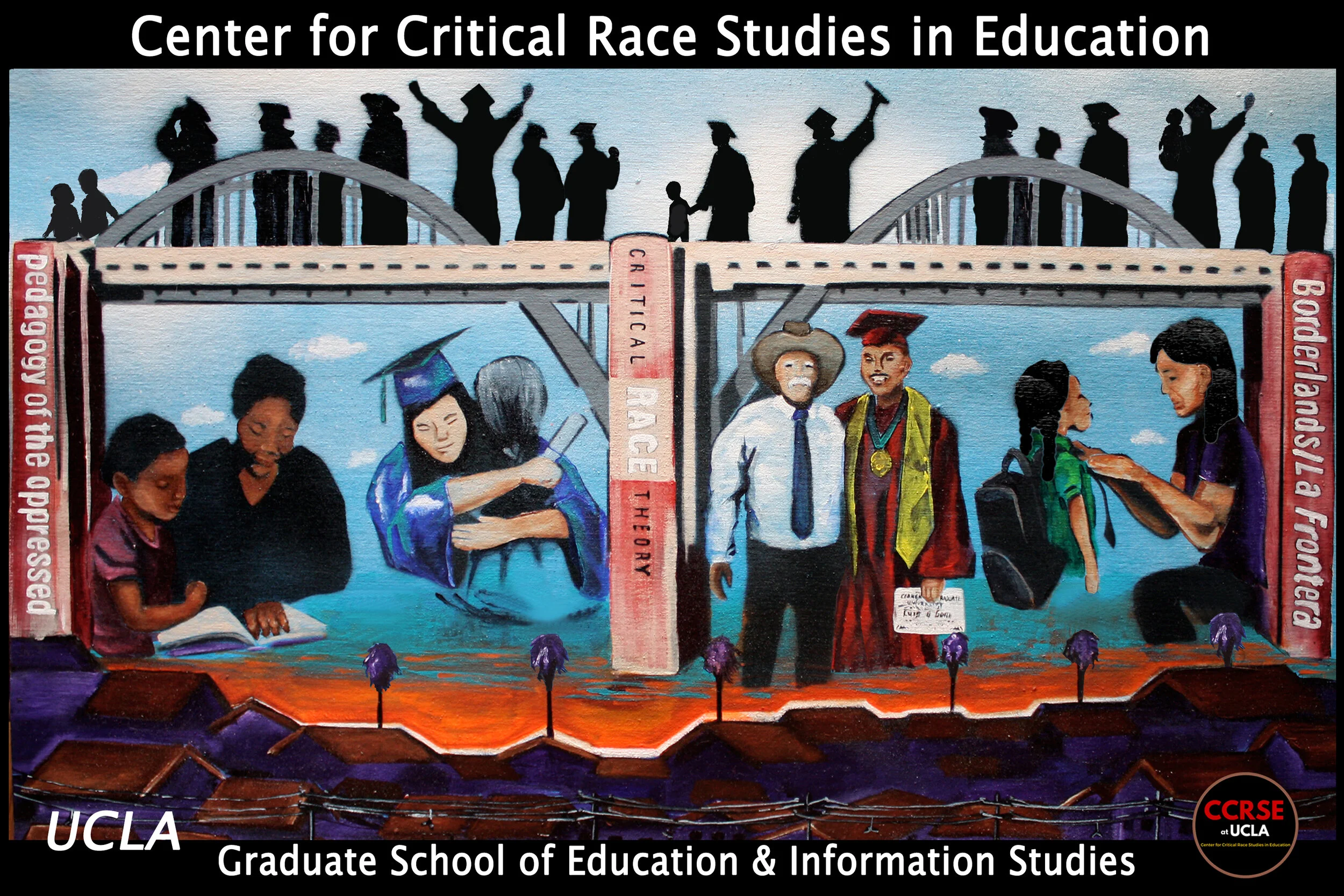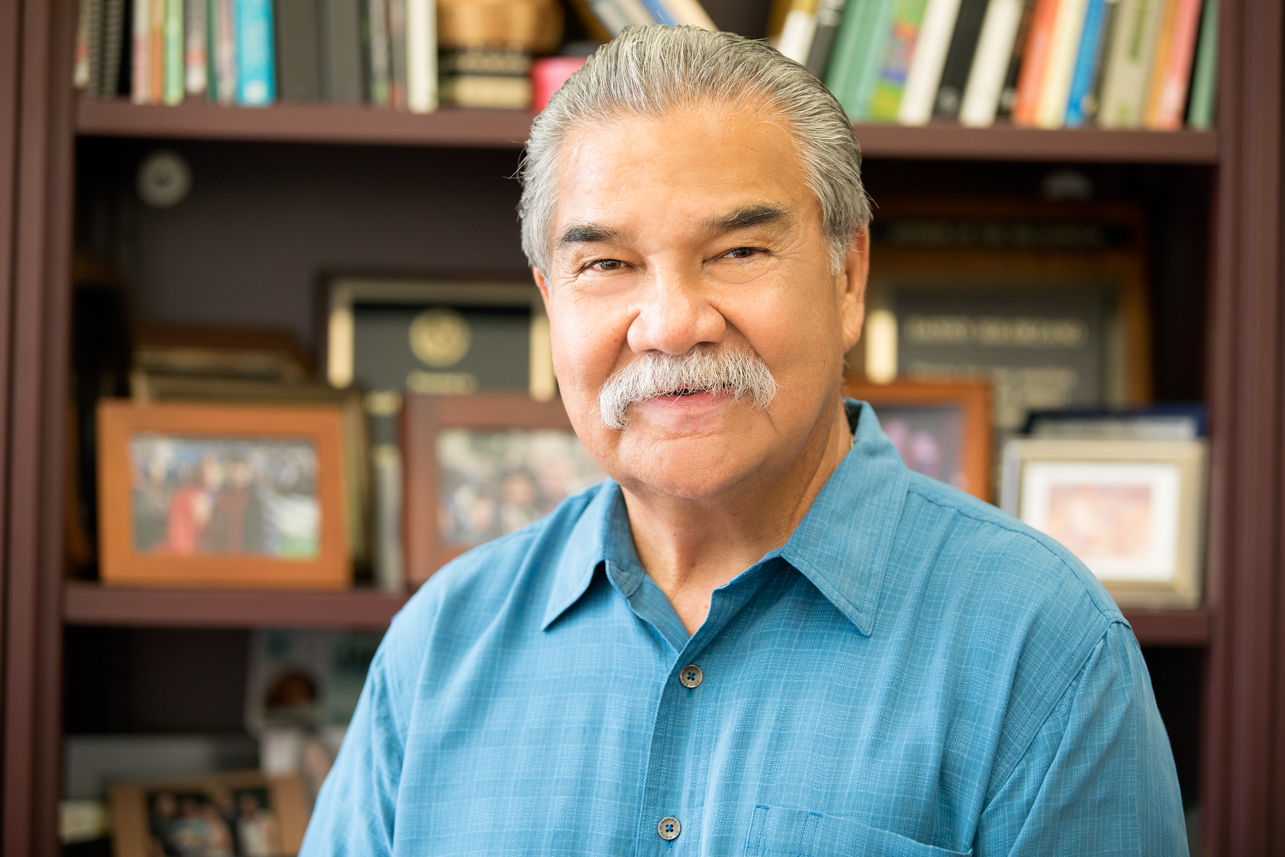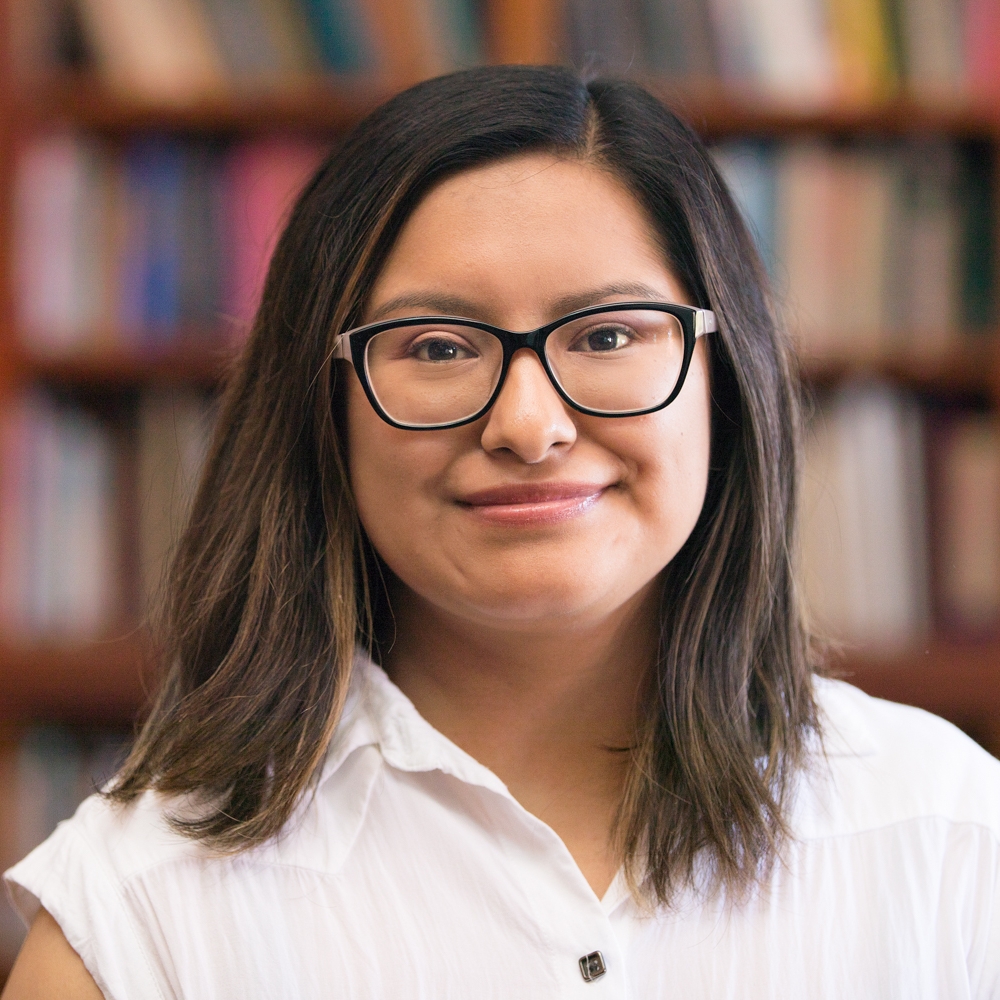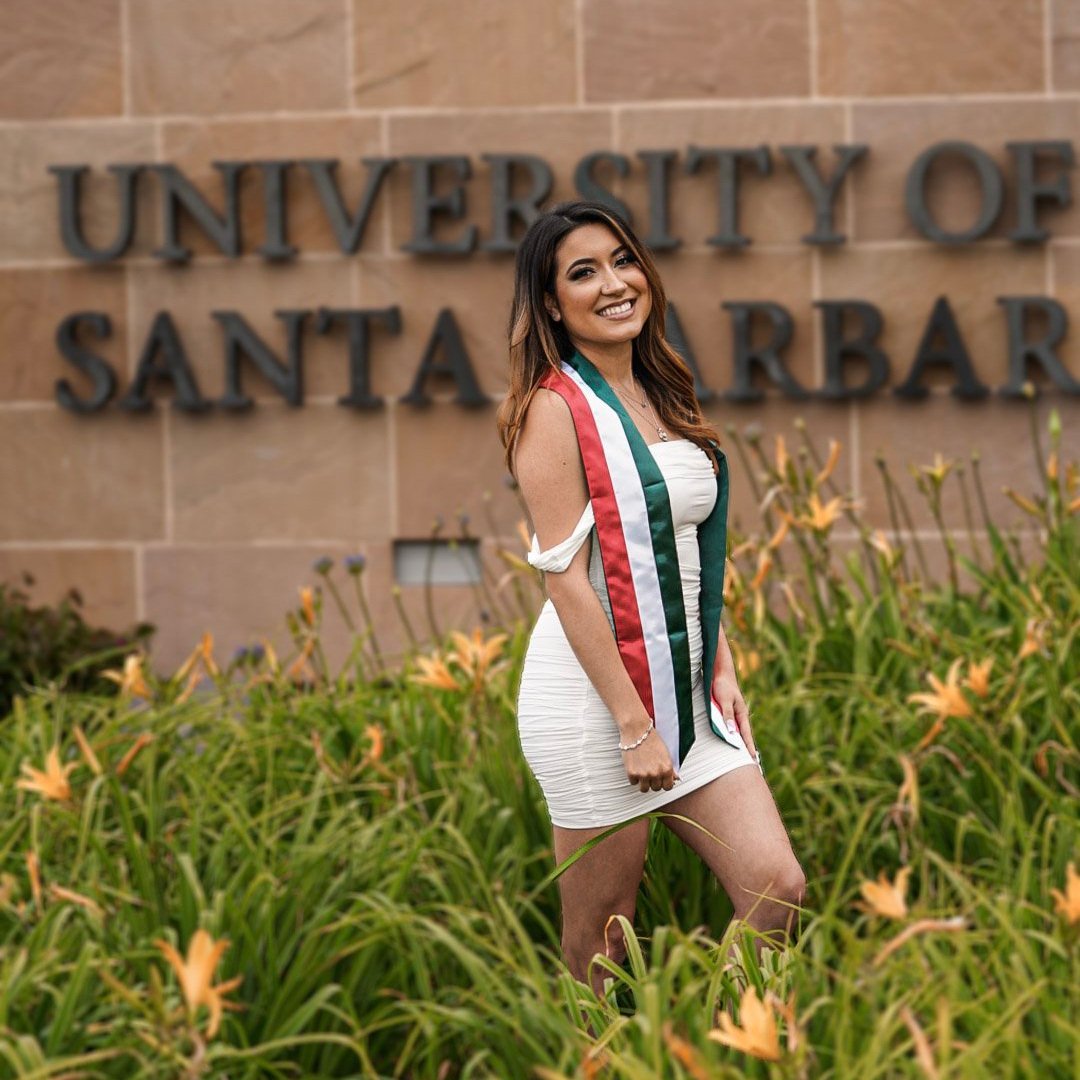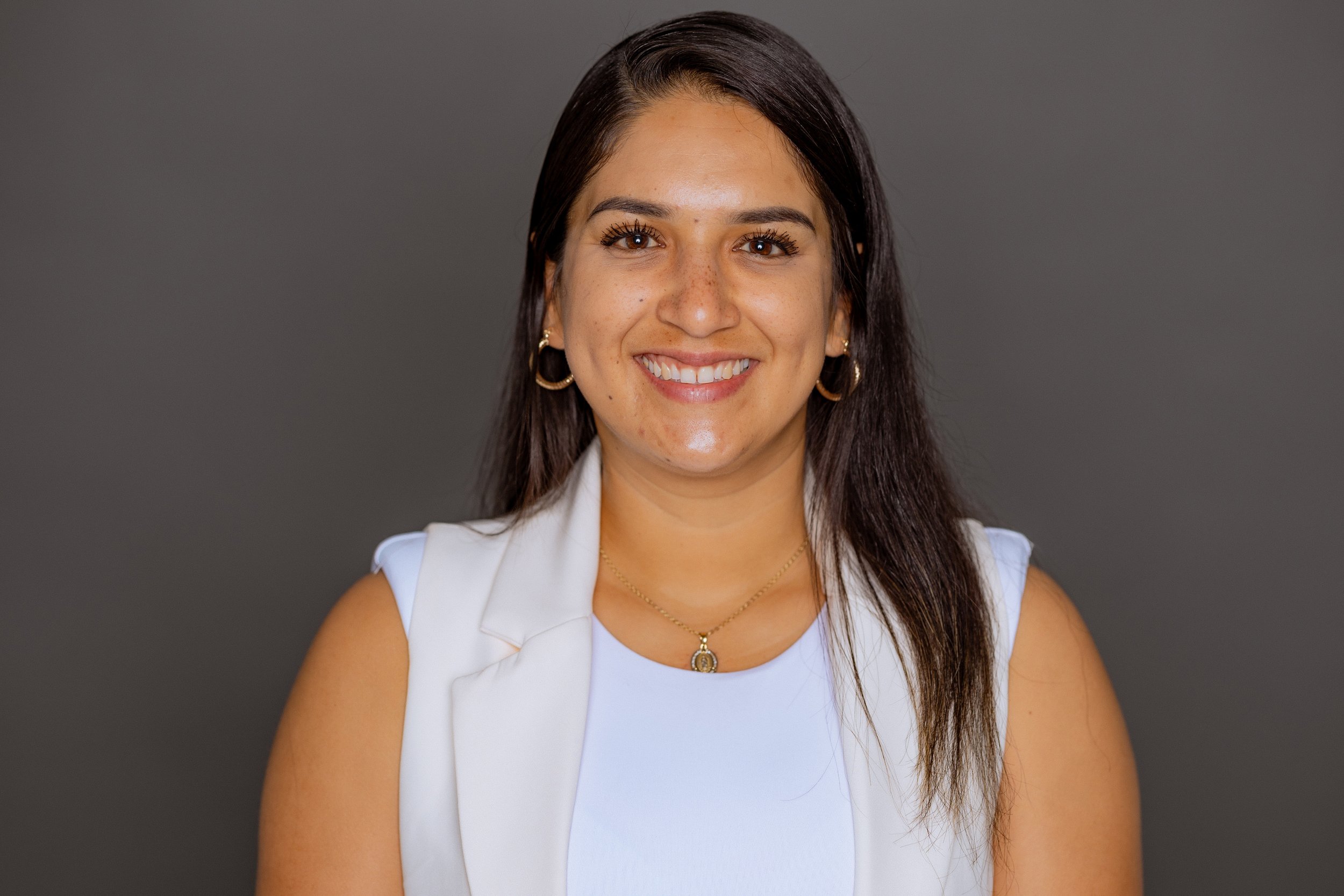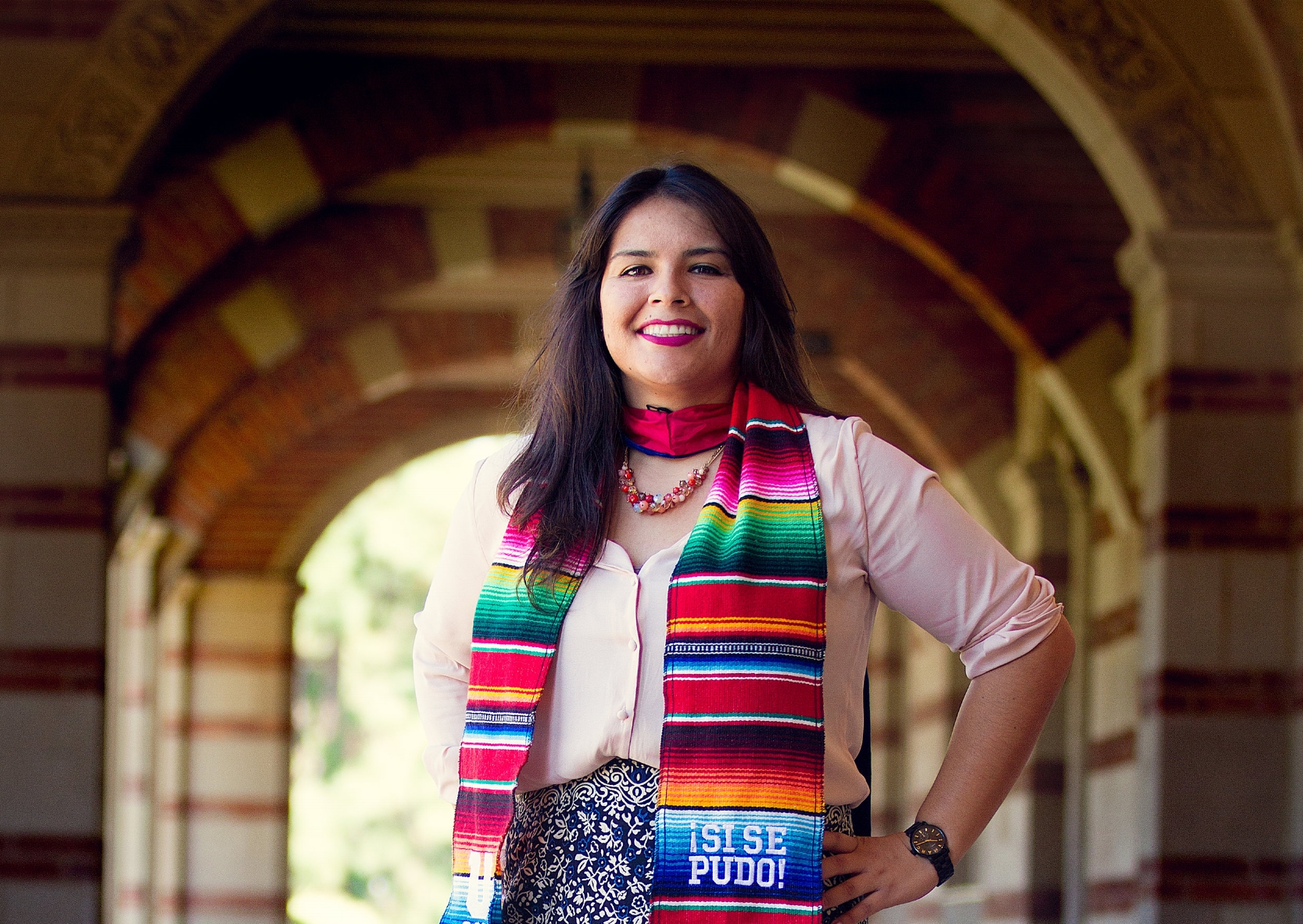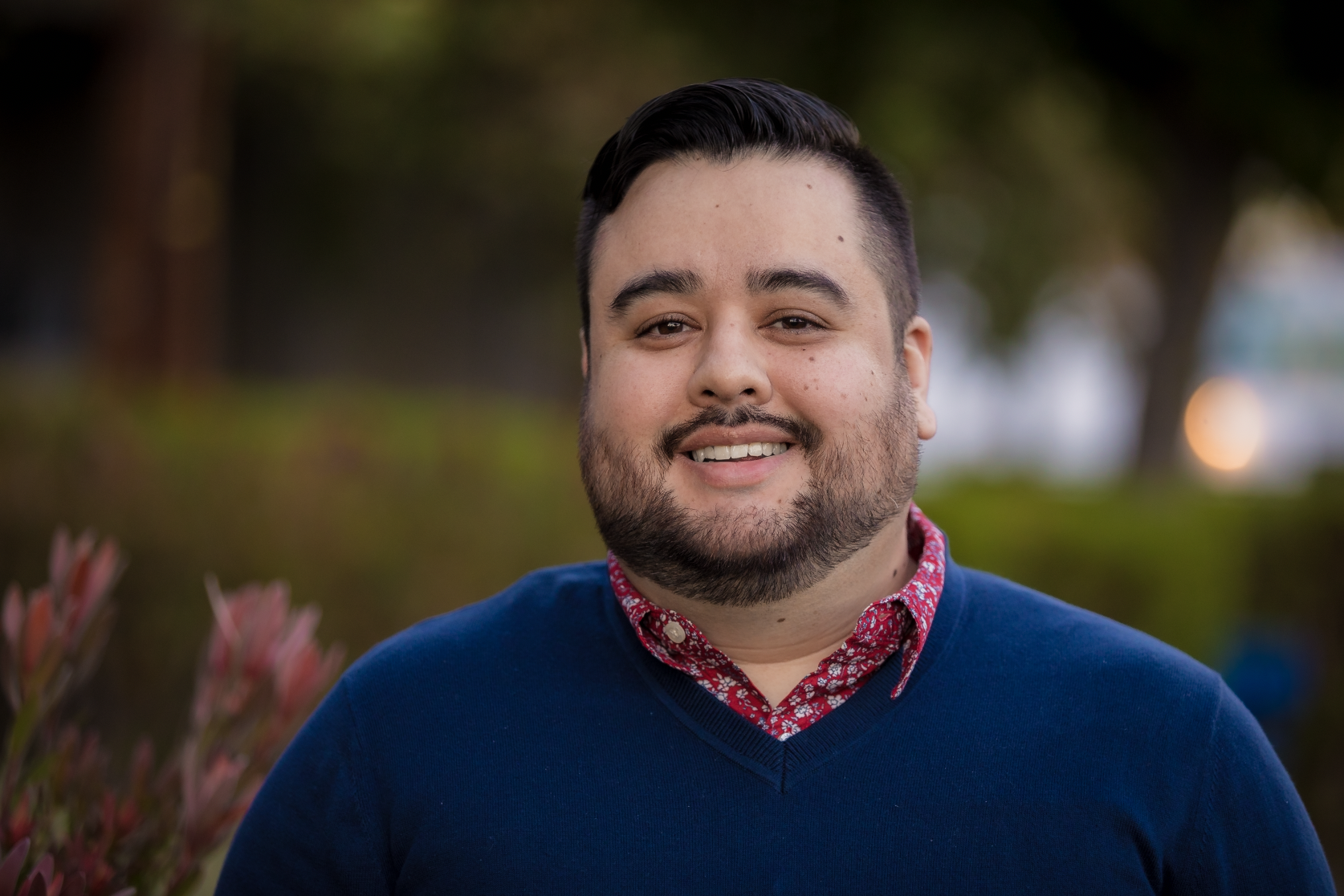
about us
The Center for Critical Race Studies in Education (CCRSE) at UCLA along with the staff, visiting scholars, and invited authors are dedicated to producing and publishing research with the goal of exploring questions related to theoretical frameworks, methodology, methods, conceptual tools, and practice associated with Critical Race Studies. The inaugural research briefs series was released in June 2016 with five issues. They explored cultural intuition, racial battle fatigue, racial microaggressions, critical race history methodology, and community cultural wealth.
Established in 2015, the Center for Critical Race Studies in Education at UCLA engages scholars and community members in interdisciplinary research that expands our understanding of crucial educational and social inequality issues. Centering the role of race, racism, and their intersectionality with other forms of discrimination such as sexism, classism, homophobia, and ableism, is key to the CCRSE mission. Producing and supporting research that explicitly highlights historical and contemporary issues impacting Communities of Color is an important step toward achieving educational equity.

people
The Center for Critical Race Studies in Education at UCLA's staff, research associates, and visiting scholars are dedicated to the advancement of Critical Race Studies within the disciplines. Please feel free to contact us with any questions or feedback.
director
Daniel G. Solorzano, Ph.D.
solorzano@gseis.ucla.edu
Daniel G. Solorzano is a professor in the University of California Los Angeles' Departments of Education and Chicana/o and Central American Studies. He is also the Director of the Center for Critical Race Studies in Education at UCLA. He is an interdisciplinary scholar with research and teaching interests in critical race theory, racial microaggressions and microaffirmations, and critical race spatial analysis. He is the co-author (with Lindsay Perez Huber) of Racial Microaggressions: Using Critical Race Theory to Respond to Everyday Racism (2020), which examines how People of Color are impacted by and respond to everyday racism in the form of racial microaggressions. He is also co-editor (with Michaela Mares-Tamayo) of the award-winning anthology The Chicana/o Education Pipeline: History, Institutional Critique, and Resistance (2018), which traces 45 years of education scholarship in the oldest Chicana/o Studies journal in the U.S.—Aztlán: A Journal of Chicano Studies. For his early body of work, Solorzano received the Tomas Rivera Center Postdoctoral Fellowship, the Educational Testing Service Postdoctoral Fellowship, and the Ford Foundation Postdoctoral Fellowship. For the last 50 years, Solorzano has served in all three segments of California's public postsecondary education. In 2007, Professor Solorzano received the UCLA Distinguished Teaching Award. In 2012, Solorzano was presented with the American Education Research Association (AERA) Social Justice in Education Award. In 2012, Solorzano was also awarded the Critical Race Studies in Education Association Derrick A. Bell Legacy Award. In 2013, Solorzano was given the Mildred Garcia Exemplary Scholarship Award from the Association for Studies in Higher Education (ASHE). In 2014, Solorzano was elected a Fellow of the American Education Research Association. In 2017, Solorzano received the inaugural Revolutionary Mentor Award from the Critical Educators for Social Justice (CESJ) within the American Educational Research Association. In 2019, Professor Solorzano delivered the AERA Distinguished Lecture on Racial Microaggressions. In 2020, Solorzano was elected to the National Academy of Education. In 2022, Professor Solorzano received the Spencer Foundation Mentorship Award.
Professor Solorzano grew up in Los Angeles, California, and received a B.A. degree from Loyola University in Sociology and Chicana/o Studies, an M.Ed. in Urban Education from Loyola Marymount University, and an M.A. and Ph.D. from the Claremont Graduate School in the Sociology of Education.
assistant Director
Magali Campos, M.A.
maxcampos@ucla.edu
Magali Campos is a doctoral candidate in the Social Science and Comparative Education program (Race and Ethnic Studies specialization) at UCLA GSE&IS. As the assistant director, she is responsible for providing administrative support, participating in research projects, developing programming, and leading the research briefs series. Magali is also a teaching assistant for the Chicana/o Studies Department at UCLA. Her research interests include retention of women of color in higher education, silence as a form of resistance to navigate academia, and femtor/mentorship practices.
Research Associate
Omar Ismael Alvarado, M.Ed.
oalvarado@ucla.edu
Omar is a doctoral student specializing in Race, Ethnic, and Cultural Studies in Education. Broadly, he is interested in understanding student experiences in higher education and their trajectories to graduate programs. Specifically, he hopes to learn how exposure to Critical Race Theory impacts students’ journeys to post-secondary education. As a son of the Central American diaspora, he is learning to honor the stories and legacies of his colleagues who entrust them to him. His research pulls from Critical Race Theory, Critical Legal Studies, Education History, and Central American Studies. He earned his Master’s of Education in Student Affairs and his Bachelor’s in Chicana/o and Central American Studies with a minor in History, with an emphasis on Mesoamerica at the University of California, Los Angeles. His journey through higher education is a meaning-making project as much as an academic endeavor.
Research Associate
Janelle Atienza, M.A.
Janelle (she/ella) is a Mexipina, first-generation doctoral student at UCLA’s School of Education and Information Studies specializing in Race, Ethnic, and Cultural Studies. Her research interests include understanding Student of Color epistemological resistance to inform decolonial and abolitionist education, interrogating underlying oppressive ideologies foundational to school systems, and exploring multiracial student experiences. Janelle’s current research focuses on demystifying the covert and dehumanizing cultures of white supremacy, capitalism, and patriarchy in schools, analyzing the role schools have in promoting internalized dehumanization, and exploring the various ways Students of Color practice everyday resistance through joy, rest, and refusal.
research associate
Kourtney Kawano, M.A.
k14kokawa@g.ucla.edu
Kourtney Kawano (she/her) is a Kanaka ʻŌiwi (Native Hawaiian) doctoral student in the Social Sciences and Comparative Education division of UCLA's School of Education and Information Studies. Her research interests include conceptualizing and applying Native Hawaiian feminist epistemology and Kanaka ʻŌiwi critical race theory to understand and challenge internalized oppression and Hawai'i's multicultural society myth. Additionally, Kourtney volunteers with Honua Scholars, a non-profit organization based in Hawai'i that offers STEM-focused programming for local youth.
research associate
John Pak, M. ED.
johnpak@g.ucla.edu
John Pak is a doctoral student at UCLA’ s Graduate School of Education and Information Studies with a specialization in Race and Ethnic Studies. As a Deaf student of color, John’s research explores the experiences of deaf students of color and the impact of audist and racial microaggressions in higher education. His research interests centers around the intersections of audism and racial microaggression in education, impacts on deaf students of color, Critical Race Theory and Critical Deaf Theory in education, and Community Cultural Wealth.
research associate
yadira valencia, m.a.
yaya2yadi@g.ucla.edu
Yadira Valencia is a doctoral candidate in the Social Science and Comparative Education division (Race and Ethnic Studies specialization at UCLA GSE&IS). She is the cohort coordinator of the UndocuBruins Research Program that is hosted in the Academic Advancement Program at UCLA. Through UndocuBruins she works along with undocumented students through their process in to graduate programs and research experience. Additionally, she is TA for the Chicana/o Studies department, her department as an undergraduate student. Currently, her research looks at redefining violence that Chicanas and Latinas encounter in their graduate program and analyzing their healing methods as resistance.
research associate
Nataly Anai Rincon Garcia, B.a.
natalyarincon@g.ucla.edu
Nataly (she/her/ella) is a Novice TEP & Master's student at the School of Education and Information Studies. She completed her undergraduate degree at the University of California, Santa Barbara with a Chicana/o/x Studies major and Educational Studies major. She is pursuing a Social Studies teaching credential with an Ethnic Studies emphasis and a Master's in Education. Her research interests include Ethnic Studies implementation in schools and building community amongst families and schools in the K-12 system.
media coordinator
Brenda Lopez, M.A.
byl230@g.ucla.edu
Brenda Lopez is a doctoral candidate in the department of Social Sciences and Comparative Education at UCLA. Her research centers on students of Color using media as a form of transformative resistance. Brenda was born and raised in Fontana, California and went on to earn her B.F.A. from Tisch School of the Arts at NYU in Film and Television. She is a filmmaker, photographer and storyteller eager to share the experiences of marginalized communities through accessible mediums.
Research Assistant
Brenda Chavez, B.A.
Brenda Chavez transferred from Santa Ana College to UCLA where she completed her undergraduate degree in Psychology with a minor in Education Studies. During her time at UCLA she was a research fellow with AAP’s Educators for Tomorrow and a research assistant for the Research, Assessment and Evaluation. Brenda's research centers the experiences of non-traditional Latinx students in higher education, specifically community colleges. She currently works at Santa Ana College as a Student Services Specialist for the EOPS, CARE, and CalWORKs programs and volunteers for the Transfer Mentor Program where she provides culturally-relevant mentoring to first-generation BIPOC students on the transfer path.
Research Assistant
SARAHY TORRES
Sarahy Torres is a third-year undergraduate student from Oxnard, California. She double majors in Chicanx Studies and Education and Social Transformation at UCLA. As a research intern, she co-teaches a college transition class to high school seniors at the RFK UCLA Community School. She is a current research fellow for the Educators for Tomorrow research program. Her research focuses on the mental health of students from farmworking backgrounds using critical race and social-emotional learning theories. She currently serves as a state council representative for the Student California Teacher Association (SCTA), advocating for curriculum and instruction in California.
visiting scholar
Lluliana Alonso, Ph.D.
lluliana@ucla.edu
LLuliana Alonso is an Assistant Professor of Urban Education in the Liberal Studies Department at California State University Long Beach. As an interdisciplinary scholar, her research centers local Chicana/o community histories of education, specializing in the nexus between juvenile delinquency discourse and educational policy & practice in the first half of twentieth century. Her work builds on previous scholarship that documents the pervasiveness of racism within and beyond schools in Los Angeles between 1930-1949. In addition, a second strand of her research agenda examines the educational trajectories and conditions of Latina/o teacher candidates in rural fronterizo contexts along the U.S./Mexico borderlands. Originally from South Central Los Angeles, she is a proud first-generation college graduate who began her educational trajectory at Santa Monica College and transferred to University of California Los Angeles (UCLA) where she obtained a B.A. in Political Science, M.A. in Education and Ph.D. in Social Science and Comparative Education with a focus on Race & Ethnic Studies.
Visiting Scholar
Lorena Camargo Gonzalez, ph.d.
lcamargo@ucla.edu
Lorena Camargo Gonzalez [she/her/ella] is an Assistant Professor of Undergraduate Studies in Education and Gender Equity at Sacramento State University. Dr. Camargo Gonzalez earned her Ph.D. from UCLA’s School of Education and Information Studies with a specialization in Race and Ethnic Studies. She also holds a master’s degree in education from Long Beach State University and a bachelor’s degree in Ethnic Studies with a concentration on Chicana/o Studies from Sacramento State University. Her educational experiences as an immigrant and first-generation college student inform her interdisciplinary approach in drawing from Critical Race theories, Chicana/Latina Feminist theories, and historical methods such as oral histories and archival research to address the following areas: 1) the activism of Latina/o/x librarians; 2) racial justice within library services, and 3) the history of Latina/o/x children’s literature. Dr. Camargo Gonzalez’s research has been published in book chapters and journal articles including the Handbook of Latinos and Education, Urban Education, and the International Journal of Qualitative Studies in Education. Dr. Camargo Gonzalez also serves as a visiting scholar for UCLA’s Center for Critical Race Studies in Education.
Visiting Scholar
gabriela Corona Valencia, pH.d.
gcoronav1995@ucla.edu
Gabriela Corona Valencia is a Ph.D. candidate at the School of Education and Information Studies. She is an educator, researcher, and bridge-builder passionate about versatile ways of knowing, learning, and thinking. Her work explores eugenicist methods of control, containment, and surveillance inflicted by educational, familial, religious, and digital spaces that have affected Latina/o/x women's access to their sexual citizenship throughout time, space, and place. She utilizes digital archival sources to pinpoint evidence of Latina/o/x girls and women punished for “crimes” related to impermissible female pursuits of pleasure and desire between 1909 and 1979. Her methodological intentions seek to uphold the buoyant oral histories of past and present Latina/o/x girls and women who have experienced systemized trauma throughout their lives. In addition, she has supported international antiracist initiatives organized by the International Planned Parenthood Federation as a qualitative research consultant. Before her graduate school journey, Gabriela obtained her BA in Chicana/o/x studies with a minor in Anthropology from CSU Dominguez Hills.
Visiting Scholar
Cindy Raquel Escobedo, Ph.d.
Cindy R. Escobedo is a Ph.D. Candidate from UCLA's Graduate School of Education and Information Studies, a 2020 National Academy of Education/Spencer Foundation Dissertation Fellow, and a 2020-2021 UC Office of the President Dissertation Fellow. As a scholar practitioner, Cindy’s professional and research passions explore the intersections of educational (in)equities, Student and Women of Color academic pathways, mother-daughter relationships, and the raced and gendered sociology of family. Cindy is concurrently a Research Associate for the Center for Critical Race Studies in Education at UCLA and has for the past seven years, served as a Senior Research Consultant for the Peer Learning Unit within the UCLA Academic Advancement Program (AAP). AAP is the nation's largest undergraduate student diversity program promoting academic excellence for scholars from historically underserved backgrounds. A three-time UCLA Bruin, Cindy holds a M.A. degree in Education, and a B.A. degree in Political Science with double minors in Education and Public Affairs.
Visiting Scholar
Tanya J. Gaxiola Serrano, Ph.D.
tgaxiolaserrano@sdsu.edu
Dr. Tanya J. Gaxiola Serrano (she, her, ella) is Assistant Professor in Administration, Rehabilitation and Postsecondary Education (ARPE) at San Diego State University. Dr. Gaxiola Serrano earned her Ph.D. from UCLA’s Graduate School of Education and Information Studies with a specialization in Race and Ethnic Studies. During her time at UCLA, she served as a founding member and assistant director for the Center for Critical Race Studies in Education. She is a Ford Foundation Fellow and American Association of Hispanics in Higher Education (AAHHE) Graduate Student Fellow and Faculty Fellow. Dr. Gaxiola Serrano is a student of Critical Race Theory and Chicana/Latina feminisms. As a first generation immigrant and college student from the Tijuana-San Diego borderlands, her research explores the racialized inequities faced by Communities of Color when navigating educational and border spaces, as well as conceptualizes critical methodological approaches in higher education. Dr. Gaxiola Serrano’s research has been published in book chapters and journal articles including the Community College Journal of Research and Practice, the Journal of Latinos and Education, and the International Journal of Qualitative Studies in Education.
visting scholar
Elizabeth González Cárdenas, Ph.D.
Egonzalezcardenas@unm.edu
Elizabeth González Cárdenas received her Ph.D. in Education with an emphasis on Race and Ethnic Studies from the University of California, Los Angeles. She was born and raised in Boyle Heights, California. Her family migrated to East Los Angeles in the early 1960s from México. Dr. González Cárdenas was also a community college student who majored in Chicana Chicano Studies, which led her to her research and teaching interests. Dr. González Cárdenas’ approach to her research is multi-disciplinary and incorporates the fields of education, sociology, and history to examine the efficacy of Chicana Chicano Studies curriculum and pedagogy. Using oral interviews and archival research, her findings demonstrate that participants developed and maintain a social justice ethos within their careers, family, and community. Her research also demonstrates that Chicana Chicano Studies provides culturally relevant support towards students when obtaining their baccalaureate degrees. Dr. González Cárdenas has published research on community-based learning in Chicana Chicano Studies and is currently researching the intellectual, curricular, pedagogical, and research impact of Chicana Chicano Studies. In addition to her research, Dr. González Cárdenas taught K-Graduate School in California public schools from 2000-2019 that include LAUSD, LBUSD, CSU, UC, and LACCD systems. Dr. González Cárdenas’ research interests include the following: Chicana/Chicano Latina/Latino Educational Access and Equity, Culturally Relevant Curriculum and Pedagogy, History of Education, Student Educational Movements, Sociology of Education, Chicana and Women of Color Feminism and Epistemologies, Critical Race Theory, and Latina/Latino Critical Theory.
Visiting Scholar
Tonia F. Guida, PH.D.
tonia.guida@austin.utexas.edu
Dr. Tonia Guida is a higher education scholar-practitioner with more than nine years of experience teaching, training, and facilitating social justice education and dialogue facilitation. She is both the Assistant Dean for Opportunity and Belonging and an Assistant Professor of Instruction in the Division of Pharmacy Practice at The University of Texas at Austin. As Dean in the College of Pharmacy, Dr. Guida leads the Opportunity and Belonging portfolio of the college and serves as the chief college spokesperson for all programs and initiatives relating to the college’s Opportunity and Belonging goals. Dr. Guida's research agenda entails theorizing around whiteness in higher education and developing more racially and socially just campus environments. Her most recent scholarship has been featured in Taboo: The Journal of Culture and Education, Urban Education, The Review of Higher Ed, Journal of Student Affairs Research and Practice, and Community College Review.
VISITING SCHOLAR
'INOKE HAFOKA, PH.D.
inoke.hafoka@byuh.edu
‘Inoke Hafoka is an Assistant Professor for Pacific Studies at Brigham Young University-Hawaii which is situated within the Ko'olauloa region of O'ahu. Hafoka descends from the villages of Faleloa, ‘Uiha, Taoa and Ha‘akio in the Ha‘apai and Vava‘u regions of Tonga. He is connected and was raised in the Glendale neighborhood of Soonkahni (Salt Lake Valley), Utah. Hafoka’s work has appeared in AlterNative, Journal of College Student Development, Journal of Diversity in Higher Education, Journal of Global Indigeneity, Oceania, and Pacific Studies. Hafoka received his Ph.D. from UCLA in the Social Sciences & Comparative Education (SSCE) with an emphasis on race and ethnic studies. His teaching and research interests include Pacific Studies, diaspora, educational spaces within and beyond tertiary schooling, Indigeneity, race and ethnicity, and sports.
Visiting Scholar
ALEJANDRA MAGAñA GAMERO, Ph.d.
alemagana310@g.ucla.edu
Alejandra Magaña Gamero received her Ph.D. in Social Sciences and Comparative Education with an emphasis in Race and Ethnic Studies from the University of California Los Angeles in 2023. Her dissertation explored the experience of Mexicanas/Chicanas in Master of Arts in Education Programs and the factors that influence their decisions to pursue graduate degrees. Alejandra currently serves as Institutional Engagement Manager for Excelencia in Education, a higher education non-profit that accelerates Latino student success in higher education by promoting Latino student achievement, conducting analysis to inform educational policies, and advancing institutional practices while collaborating with those committed and ready to meet the mission. Alejandra holds a Master of Arts in Education from the University of California Los Angeles and a Bachelor of Science in Psychology and Ethnic Studies from Santa Clara University.
visiting scholar
Michaela Mares-Tamayo, Ph.D.
michaela.j@ucla.edu
Michaela Mares-Tamayo received her Ph.D. in Race and Ethnic Studies in Education at UCLA, exactly fifty years after her father became the first in their family to graduate from college – also from UCLA. Her research brings together the epistemological strengths and methodological tools of critical race theory in education, history, and Ethnic Studies to document the experiences of Students and Communities of Color in local school districts over time. She has been invited to present at staff trainings for the UCLA Center for Community College Partnerships; university courses and community events; and in the form of the opening lecture for the Vrije University’s Introduction Days in Amsterdam, Netherlands. As a Visiting Scholar, she recently completed a co-edited anthology of 40 years of education scholarship in the oldest journal in Chicana and Chicano Studies—Aztlán: The Journal of Chicana and Chicano Studies, titled The Chicana/o Education Pipeline: History, Institutional Critique, and Resistance, with Dr. Solórzano.
visiting scholar
Socorro Morales, Ph.D.
socorrom1@cpp.edu
Socorro Morales (she/her) is a queer Chicana raised in Fontana, CA. She earned her Ph.D. from the University of Utah in Education, Culture, and Society. Her research agenda focuses on understanding and promoting educational equity for historically marginalized populations, specifically through the lenses of Critical Race Theory, Chicana feminisms, and critical youth studies. In particular, she examines the educational experiences of Chicanx and Latinx youth, focusing on subjectivity, youth agency, and pedagogical practice. She is currently an Assistant Professor in the Educational Leadership Department at California State Polytechnic University, Pomona. Her publications span across areas such as Chicanx youth agency and resistance in K12 as well as Chicana feminist pláticas methodology.
Visiting Scholar
Audrey D. Paredes, ph.d.
aparedes@csusm.edu
Audrey D. Paredes, Ph.D. is an assistant professor of educational leadership and administration in the School of Education at California State University, San Marcos (CSUSM). Her role as a teacher-scholar is informed by her positionality as the daughter of Guatemalan immigrants, first-generation college student, and a former college student affairs practitioner. As an interdisciplinary scholar, Dr. Paredes’ broader research agenda utilizes critical approaches to understand and conceptualize the ways in which institutions of higher education, specifically Minority Serving Institutions (MSIs), can be sites of transformation so that systemically marginalized communities can thrive. Currently, her research focuses on responding to the heterogeneity of the Latina/o/x college student population within the context of federally designated Hispanic Serving Institutions (HSIs) by way of examining the lived experiences of Central American undergraduates. Dr. Paredes’ has expertise in anti-racist and decolonial theories such as Critical Race Theory and Chicana/Latina Feminist Theories as well as, Chicana/Latina Feminista qualitative methodologies. Prior to joining CSUSM, she was a post-doctoral scholar at UCLA, the lead project manager for the University of California’s Hispanic Serving Institutions (UC-HSI) Initiative, and a consultant for the UC Asian American Native American Pacific Islander Serving Institutions (AANAPISI) working group. Dr. Paredes earned her Ph.D. in education with a specialization in race and ethnic studies at the UCLA, MA in education at UCLA, and BA in Gender, Ethnicity, and Multicultural Studies (concentration in Chicana/o Studies) from California State Polytechnic University, Pomona.
Visiting scholar
bryant partida, Ph.D.
brypar@ucla.edu
Bryant Partida was born in East Los Angeles, raised in South Phoenix, and is currently rooted in Pacoima. He earned his Ph.D. from UCLA in Social Science and Comparative Education with an emphasis on Race and Ethnic Studies. Bryant’s research agenda focuses on documenting the 20th-century educational histories of Mexican, Mexican American, and Chicana/o communities in Phoenix, Arizona through a Critical Race Educational History and relational lens. He is currently expanding his dissertation work focusing on the 1970 Chicana/o boycott of Phoenix Union High School into diverse research strands that include a wider district relational analysis of race and racism in the Phoenix Union High School District between 1895 and 1982, further documenting the history of segregated Mexican schools in the Valley, and early 1900’s historical Mexican and Mexican American educational social movements at Arizona State Teachers College. Bryant has also translated his interdisciplinary research skills to serve as a public history consultant and co-curator of Chicana/o educational and community history exhibits that have been displayed throughout Los Angeles, California, and Phoenix, Arizona. He is currently a lecturer in Chicana/o Studies at CSU Fullerton and CSU Dominguez Hills.
Visiting scholar
Lindsay Pérez Huber, Ph.D.
Lindsay.PerezHuber@csulb.edu
Dr. Lindsay Pérez Huber is Professor in the College of Education at California State University, Long Beach. She leads and coordinates the master’s program in Equity, Education, & Social Justice (EESJ) program. Her research specializations include race, immigration and higher education, racial microaggressions, and critical race feminista methodologies and epistemologies. Her work is known for further developing theoretical and conceptual frameworks in Critical Race Theory (CRT), bridging CRT and Chicana Feminist perspectives in Education, and for her contributions in understanding Latinx undocumented student experiences. Dr. Pérez Huber is a Ford Foundation Fellow and Faculty Fellow of the American Association of Hispanics in Higher Education (AAHHE). She is also the past Vice President of the Critical Race Studies in Education Association (CRSEA). During her career, Dr. Pérez Huber has supported over 70 thesis and dissertation Students of Color as chair and/or committee member. Dr. Pérez Huber was a recipient of the 2019 Derrick Bell Legacy Award for her contributions to Critical Race Theory (CRT) by the Critical Race Studies in Education Association (CRSEA). She received her Ph.D. in Social Science and Comparative Education (SSCE), with a specialization in Race and Ethnic Studies from the UCLA Graduate School of Education and Information Studies. In 2020, Dr. Pérez Huber published the co-authored book, “Racial Microaggressions: Using Critical Race Theory to Respond to Everyday Racism.” She is also co-editor of the 2021 book, “Why They Hate Us: How Racist Rhetoric Impacts Education.”
visiting scholar
Ryan E. Santos, Ph.D.
rsantos84@ucla.edu
Ryan E. Santos’ interdisciplinary training is rooted in the fields of education and ethnic studies; having earned his B.A. in Chicano and Latino Studies from California State University, Long Beach, and completing his M.A. and Ph.D. in Education at UCLA with a specialization in Race and Ethnic Studies. Ryan’s research interests are historical studies of educational issues and legal cases, such as segregation and bilingual education, relevant to Chicana/o and Latina/o communities through a Critical Race Educational History framework. His current research on the school desegregation efforts found in Crawford v. Los Angeles Board of Education (1963-1982) contextualizes the events of Crawford within the larger Chicana/o movement struggle for social justice. His co-authored research on Latina/o community college student experiences with developmental education has been published in the Journal of Hispanic Higher Education, a Perspectivas policy brief, and a PATHWAYS to Postsecondary Success policy report. Ryan was the recipient of a UCLA Dissertation Year Fellowship and an American Educational Research Association (AERA) Minority Dissertation Travel Award.
Visiting Scholar
Mary Senyonga, Ph.D.
Mary Senyonga is a doctoral candidate in the Social Sciences and Comparative Education division with a specialization in Race and Ethnic Studies within the Graduate School of Education and Information Studies. Her dissertation investigates how Black women and femmes both resist and heal as they attend what she calls Traditionally Oppressive Institutions. Her work employs Black feminism, Critical Race Theory, and Queer of Color Critique to surface liberatory possibilities in the face of marginalization.

publications
The Center for Critical Race Studies in Education (CCRSE) at UCLA's inaugural Research Briefs Series was released in June 2016 with a total of five issues. In June 2017 the second CCRSE Research Briefs Series was published with an additional six issues. As of 2022, a total of 20 Research Briefs have been published, they explore: cultural intuition, racial battle fatigue, racial microaggressions, critical race history methodology, community cultural wealth, internalized racism, muxerista portraiture, critical race counterspaces, Asian American Critical Race Theory, critical race educational history, critical race spatial analysis, Chicana/o student activism in Los Angeles, intersectionality, holistic critical race pedagogies, and racial microaffirmations. Please click on the learn more button under each brief to download.
Dolores Delgado Bernal
University of Utah
Cultural intuition, deeply informed by Chicana feminist scholarship, was first introduced to the field of education in 1998 to reimagine the notion of theoretical sensitivity (Strauss & Corbin, 1990). Working from a Chicana feminist episteme, Delgado Bernal (1998) proposed that cultural intuition, the unique viewpoint that many Chicanas bring to the research process, draws from personal experience, collective experience, professional experience, communal memory, existing literature, and the research process itself.
William A. Smith
University of Utah
One of the most significant and persistent concerns for Communities of Color is the effect of racism. People of Color are constantly stressed from the burdens of defending their humanity and existence. Rarely are the diversities and intersectionalities of their humanness considered, as they are forced to respond to how dominant White society sees and treats them: as a racial group only. For example, a socially identified Puerto Rican woman might see herself not only at the intersections of race and gender but also at intersections of class, physical impairment, sexuality, phenotype, ethnicity, and languages.
Kenjus T. Watson & Lindsay Pérez Huber
University of California, Los Angeles California State University, Long Beach
Racial microaggressions are a form of systemic racism that (a) are verbal and non-verbal assaults directed toward People of Color, often carried out automatically or unconsciously; (b) are based on a Person of Color’s race, gender, class, sexuality, language, immigration status, phenotype, accent, or surname; and (c) are cumulative, taking a physiological, psychological, and academic toll on those targeted by them (Pérez Huber & Solórzano, 2015a; 2015b).
Lluliana Alonso
University of California, Los Angeles
William Tate’s (1997) seminal article posed an important question to the field of education by asking “do we in education challenge ahistorical treatment of education, equity, and students of color?” (p. 235). Using Critical Race Theory (CRT) in education (Solórzano, 1998) as a framework, this research brief illustrates innovative methodological approaches using primary sources to unearth and examine the historical educational experiences of Students of Color. Specifically, it highlights the educational trajectory of Consuelo Rivera, a Chicana student within UCLA’s Graduate School of Education in the first half of the twentieth century.
Tara J. Yosso & Rebeca Burciaga
University of Michigan, Ann Arbor San José State University
Critical race theory (CRT) is a dynamic interdisciplinary framework used to identify, analyze, and challenge the ways race and racism intersect with multiple forms of subordination to shape the experiences of People of Color (Delgado & Stefancic, 2012). Informed by critical community and academic traditions naming race as a social construction, scholars have applied CRT to the field of education to closely examine and change the very real social consequences of racism within and beyond schools (e.g. Zamudio, et al., 2011; Parker & Stovall, 2004).
rita kohli
University of California, riverside
Although heightened by the current hate-filled platform of the 45th U.S. President, scholars of Critical Race Theory (CRT) have exposed racism as a permanent fixture in the policies and practices that govern U.S. and other settler colonial and colonial societies. As people of Color are subjected to racialized structures in their daily lives, racism can have material, physiological, and psychological consequences that negatively affect the manner by which they see themselves, their culture, and the world around them.
alma itzé flores
Loyola marymount university
Moved by Gloria Anzaldúa’s (1990) call for nueva teorías, in this research brief I outline what I refer to as muxerista portraiture. As a meXicana (pronounced me-chi-cana) scholar who examines Mexicana/Chicana mother-daughter pedagogies, I argue for the partnership of portraiture (Lawrence-Lightfoot, 1983) and Chicana/Latina feminist theory (CLFT) (Delgado Bernal & Elenes, 2011). My goal is to offer a thoughtful and deliberate methodology that borrows from these two theories and not an alternative or replacement for one or the other.
socorro morales
University of California, los angeles
I spent two years as a researcher and educator collaborating with elementary aged Brown youth in creating, developing, and sustaining a Critical Race Counterspace within their elementary school. Drawing from Critical Race Theory (CRT) scholars within the field of education, I initially understood counterspaces as “sites where deficit notions of People of Color can be challenged” (Solórzano, Ceja, & Yosso, 2000, p. 70). In thinking about this definition, I sought to co-create a counterspace with Brown youth that would allow them to reimagine what “schooling” or education could look like, given the dismal state of K-12 educational curriculum for youth of color (Valenzuela, 1999).
edward r. curammeng
University of California, los angeles
tracy lachica buenavista & stephanie cariaga
california state university, northridge University of California, los Angeles
Asian American Critical Race Theory is one of numerous group-specific Critical Race Theory (CRT) movements that emerged to address the complex racialization of people of Asian descent in the United States. In particular, Asian American Critical Race scholars document a legacy of state-sanctioned, anti-Asian discrimination and violence, and problematize the marginalization of Asian American perspectives in Critical Race work (Chang, 1999; Matsuda, 1993).
Ryan e. santos
University of California, los angeles
Michaela J. López mares-tamayo & Lluliana alonso
university of california, los Angeles University of California, los angeles
In their foundational piece on Critical Race Theory (CRT) and education, Gloria Ladson-Billings and William F. Tate (1995) wrote, “Historically, storytelling has been a kind of medicine to heal the wounds of pain caused by racial oppression” (p. 57). As Critical Race theorists, we are especially invested in understanding how those actions relate to Students of Color and their educational histories.
verónica vélez
western washington university
DuBois (1903) first articulated the notion of the “color-line” more than 100 years ago. Still significant today, DuBois’ work inspired the development of Critical Race Spatial Analysis (CRSA). First conceived in 2007, CRSA emerged as part of a case study of one of the most robust color-lines in Los Angeles, California – the Alameda Corridor (Solórzano & Vélez, 2007). By utilizing maps to reveal the socio-spatial-historical significance of the Alameda Corridor, this study motivated a pursuit to further digital map-making and other geographic and spatial tools within Critical Race research in education.
José M. Aguilar-Hernández & Dolores Delgado Bernal
California State polytechnic university, pomona California state university, los angeles
In the spring of 2018, two anniversaries were commemorated in the history of Chicana/o/x student activism in Los Angeles, California: the 50th anniversary of the 1968 Blowouts and the 25th anniversary of the 1993 hunger strike for a Chicana/o Studies department at UCLA. Although separated by time and space (the blowouts were in Eastern Los Angeles and UCLA is in Westwood) both events are part of a broader history of resistance, demonstrating that Students of Color are historically committed to resisting racial inequality in educational institutions.
Mary Senyonga
University of California, Los Angeles
Intersectionality as a methodological, analytical, and liberatory tool has sharpened our naming of multiple forms of marginalization. While Kimberle Crenshaw (1989, 1993) is rightfully credited with coining Intersectionality through addressing Black women’s employment experiences and other Women of Color’s experiences with domestic violence, it is imperative that we recognize the long history of this articulation of marginalization. Within the Black feminist tradition, Black women have named the liminal space of being called to action on behalf of racial or gender liberation while our liberation is relegated as adjunct to others’ (Combahee River Collective, 1977).
Heidi M. Coronado
California Lutheran University
Critical Race Pedagogies (CRPs) allow us to engage in liberatory pedagogies for students who have historically been at the margins (Lynn, 1999). As a formerly undocumented, first-generation, Guatemalan student and academic with Mayan roots, I have seen society’s assimilationists ideologies demand marginalized populations to adhere to specific norms based on colonial legacies that are often enforced through Euro-centric curriculum, policy, and pedagogical practices in schools (Lynn & Dixson, 2013). I argue that a CRP allows us to combat the continued trauma-inducing silencing of the voices and experiences of Students of Color (Smith-Maddox & Solórzano, 2002; Yosso, 2005).
Lindsay Pérez Huber
California State University, Long Beach
Critical race researchers have theorized and documented the varied ways that racial microaggressions are used to keep those at the racial margins in their place (Pierce, 1970). Racial microaggressions are (1) verbal and/or non-verbal assaults directed toward People of Color, often carried out in subtle, automatic or unconscious forms, (2) layered, based on race and its intersections with other subordinated social identities and, (3) cumulative, taking a psychological and physiological toll on People of Color when experienced over a lifetime (Pérez Huber & Solórzano, 2015). Naming racial microaggressions disrupts the normalized existence of racism and white supremacy, and recognizes the structural inequities and collective pain they cause (Freire, 1970). Equally important, is theorizing and creating a language for the everyday strategies of affirmation and validation that Communities of Color engage as a response to racial microaggressions. This brief seeks to begin this theorizing.
Michelle Téllez
University of Arizona
Chicana M(other)work is both a conceptual framework and a call to collective action that responds to the gaps in the Chicanx educational pipeline that begin in elementary school and continue to affect the life chances of Chicanx students. This brief focuses on Chicanas in higher education who are not adequately represented in the literature by paying particular attention to the inequities experienced by Chicana and Latina mothers who are both seeking advanced degrees and academic appointments after graduate school.
kihana miraya ross
Northwestern University
While Critical Race Theory (CRT) is a theory of race and racism more broadly, it enters the fields of both legal studies and education (at least implicitly) as a Black theorization of race. In other words, in its initial formulation, CRT specifically attempts to make sense of and respond to anti-Black racism. In response to a perceived Black-white binary in CRT, other “racecrits” emerge such as LatCrit, AsianCrit, and TribalCrit; these “crits” serve to address the specificity of racial oppressions faced by non-Black People of Color. The absence of a BlackCrit then, either meant that CRT was considered the same thing as a Black critical theory, or that a theory of race and racism was enough to encompass the experiences of Black folks in the United States. Although CRT may have privileged the experiences of African Americans at its inception, in conceptualizing BlackCrit, my colleague Michael Dumas and I, problematize the notion that CRT could (or should) suffice for theorizing blackness and antiblackness.
Yadira Valencia, German Aguilar-Tinajero, Eva Amarillas, Joel Calixto, Katy Maldonado & Julio Reyes
University of California, Los Angeles
This research brief hopes to reach institutional agents and advocates who wish to implement research programs and resources for undocumented, first-generation, low-income undergraduate students—through the critical and intersectional lens of Critical Race Theory (CRT). By intentionally creating programs through CRT, we can see how students’ multiple identities and lived realities impact the research they develop, and the processes needed to support students through their research and graduate school endeavors. Yadira Valencia, was fortunate to be the coordinator for the UndocuBruins Research Program at UCLA from 2014 to 2018. It is critical to support the trajectories of undocumented scholars; especially when they are still barred from federal and state resources. This brief discusses UndocuBruins and the ways in which using CRT has and will continue to center the lived experiences of undocumented students.
Dolores Calderón
Western Washington University
Tribal Critical Race Theory (TribalCrit) was developed by Bryan Brayboy as a framework to understand the complex experiences of Indigenous peoples in education. Influenced by Critical Race Theory (CRT) in the law and the subsequent application of CRT in educational work, TribalCrit addresses both the racialized and unique political status of Indigenous peoples as members of sovereign nations. TribalCrit is guided by 9, inter-related tenets:
Janay M. Garrett
University of Pennsylvania
In this research brief I outline what I call the Critical Race Socialization (CRS) of Black Children, inspired by my master’s thesis, a qualitative project exploring how Black activist mothers aligned with the #BlackLivesMatter movement resist racism through childrearing (Watts, 2018). This theorizing of Black motherhood through CRS is fashioned from key threads of Critical Race Theory (CRT) (Delgado & Stefancic, 2017), Pedagogies of the Home (Delgado Bernal, 2001), Oppressed Family Pedagogy (Hughes, 2005) and the Cycles of Socialization/Liberation (Harro, 2000).

contact us
Please contact us at ccrse@gseis.ucla.edu or fill out the form below.
